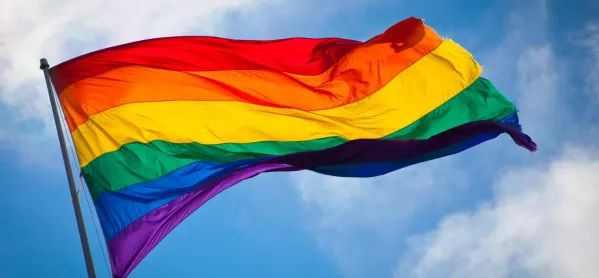There is overwhelming backing for lessons on LGBT issues in primary schools – but this support drops when it comes to lessons for the youngest pupils, according to new research shared exclusively with Tes.
Professor Jonathan Glazzard and Samuel Stones, of the Carnegie School of Education at Leeds Beckett University, surveyed 366 teachers and parents following the controversy at Parkfield Community School in Birmingham over its equality curriculum programme, named No Outsiders.
Opinion: 'Condemning "identity politics" misses the point'
Quick link: Spielman: Anti-LGBT demonstrators set ‘terrible example to children’
Profile: 'I remember being an outsider' – the teacher at the centre of LGBT row
Some 88 per cent of those surveyed disagreed with the idea that parents should have a right to withdraw their children from lessons about LGBT people.
Promoting LGBT inclusion
An overwhelming 94 per cent felt that it was important that schools teach children about LGBT identities and the same percentage felt schools had a responsibility to promote LGBT inclusion.
Eighty-eight per cent agreed that schools were not promoting a sexual orientation or gender identity when they taught children about LGBT people and relationships.
There was, however, slightly less support for involving very young children in such lessons:
- 76 per cent agreed that schools should teach children about different kinds of relationships from the age of 4.
- 73 per cent agreed that same-sex marriage should be taught from that age.
- 50 per cent agreed that four-year-olds should learn about transgender identities.
The researchers commented: “One likely explanation for this is that respondents feel that very young children are too young to learn about LGBT people and relationships.
“It is possible that respondents feel that young children need to be protected from learning about LGBT identities and relationships, either because they feel that the content will cover sex or because they believe that young children are easily influenced.”
They noted that some children would have relations who identified as LGBT and that it was normal for young children to learn about heterosexual relationships.
"Firstly, some children at the age of 4 have same-sex parents. They are aware of same-sex relationships and they may have brothers, sisters, aunties and uncles in their family who identity as LGBT. If these identities are not visible in the school curriculum, they can start to feel that their lives are not reflected in the school," the researchers said.
"Secondly, it is interesting to note that there is divided opinion on the teaching of same-sex marriage, despite the fact that in the early years children learn about heterosexual relationships through topics on ‘family’ and role-plays of mock straight weddings.
“Why is it acceptable to teach children about heterosexual relationships and not about LGBT relationships and identities?
“The data suggests that there might be a view that exposing young children to different kinds of people and relationships is somehow harmful. The findings also suggest significant resistance to teaching children about transgender identities, which indicates negativity towards the transgender community.”
They said other research demonstrated that negative attitudes toward LGBT people were “associated with lower levels of education and intelligence as well as higher levels of religious belief and political conservatism”.
Learning about people’s identity did not change simply by learning about the identities of others and “teaching children about LGBT identities will not suddenly make them LGBT”, the researchers said.
They noted opposition to teaching about LGBT issues from some religious groups and said that while religious values must be respected, “in the United Kingdom the law says that it is legal to be LGBT and also that same-sex relationships and same-sex marriage are also legal. There should be no restriction on the age that children learn this”.





